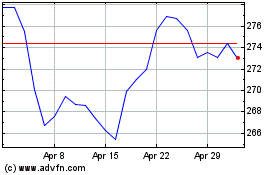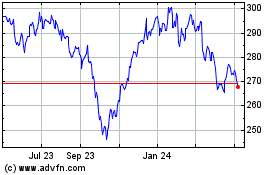Former McDonald's Executive to Sacrifice Incentives in Move to Dunkin' Brands
September 22 2016 - 7:00PM
Dow Jones News
In moving to Dunkin' Brands Group Inc., David Hoffmann may be
sacrificing more than $6 million in compensation because he ended a
22-year career at McDonald's Corp. without signing a noncompete
agreement.
The estimate of foregone pay comes from a compensation
consultant who has never advised McDonald's. The money he's leaving
on the table shows the high price some executives pay for leaving
their employer in the lurch. But Mr. Hoffmann's move may speak to
his better odds of becoming chief executive at the doughnut maker
than at the burger chain.
In a regulatory filing on Wednesday, McDonald's said Mr.
Hoffmann's "failure to satisfy certain conditions upon his
departure," including not signing a noncompete agreement, will
result in him forfeiting all unvested cash and equity incentive
awards.
Mr. Hoffmann couldn't be reached for comment.
"It's quite standard" for companies to seek such noncompete
accords from exiting executives, but executives rarely refuse to
accept them, said Robert Sedgwick, who heads the executive-pay
practice for law firm Morrison Cohen LLP.
Some companies require executives to sign a noncompete agreement
upon being hired or in exchange for getting an annual incentive
award. But such restrictions often are less onerous than the
additional ones demanded as an executive leaves.
Mr. Hoffmann didn't have any type of noncompete agreement in
place while he was working at the company, a McDonald's spokeswoman
said. She said she couldn't verify the amount of money he lost.
At McDonald's, Mr. Hoffmann, 48-years-old, ran the company's
Asia-Pacific, Middle East and Africa operations until he was
appointed in July 2015 to lead the high-growth markets
division—which includes China, Russia and South Korea. His expanded
role in the company was part of a corporate reshuffling that Chief
Executive Steve Easterbrook sought to drive growth at the
struggling burger chain.
The consultant's estimate about the money left behind included
Mr. Hoffmann's vested stock options. Some companies cancel all
outstanding options upon an executive's exit. When executives give
up certain awards, they often seek to make up for it in
compensation from the new company they join. Mr. Hoffmann will make
up some of the difference at Dunkin', but not all.
On Oct. 3, Mr. Hoffmann will assume the role of president of
Dunkin' Donuts U.S. and Canada, where he will be responsible for
the doughnut chain's operations and marketing in the two countries,
as well as global franchising and store development for both
Dunkin' Donuts and Baskin-Robbins.
In a statement Thursday announcing Mr. Hoffmann's hire, Dunkin'
Chief Executive Nigel Travis, 66, said the appointment "supports
our succession planning efforts as we work to position the company
for long-term growth."
Under his agreement with Dunkin', where he is seen as a possible
successor to Mr. Travis after the current chief's contract ends in
December 2018, Mr. Hoffmann gets equity worth about $2.8 million
and is expected to receive a fiscal 2017 award valued at about $2
million.
Mr. Hoffmann's offer agreement with Dunkin' also said that if he
is terminated without cause or resigns for good reason, he would be
entitled to severance of up to 12 months of his then current base
salary.
The Dunkin' filing Thursday also said Mr. Hoffmann will be
subject to noncompetition provisions.
Noncompete accords typically block executives from trying to
hire colleagues from their previous employer. Since Mr. Hoffmann
didn't sign one at McDonald's, he may be able to poach talent from
the company, experts say.
Sometimes avoiding a noncompete accord can also lead to an
unexpected payday. Immediately after American Airlines Group Inc.
President Scott Kirby was let go last month, he assumed the same
role at United Continental Holdings Inc. Mr. Kirby didn't have an
employment contract or a noncompete agreement, and while American
therefore wasn't obligated to give Mr. Kirby a severance package,
the company gave him more than $13 million in cash and stock.
Mr. Hoffmann is the latest high-level executive to leave the
struggling fast-food chain. McDonald's Chief Administrative Officer
Pete Bensen announced his retirement last month, followed by
McDonald's U.S. President Mike Andres, who will remain at the
company until the end of the year.
Write to Joann S. Lublin at joann.lublin@wsj.com and Julie
Jargon at julie.jargon@wsj.com
(END) Dow Jones Newswires
September 22, 2016 18:45 ET (22:45 GMT)
Copyright (c) 2016 Dow Jones & Company, Inc.
McDonalds (NYSE:MCD)
Historical Stock Chart
From Mar 2024 to Apr 2024

McDonalds (NYSE:MCD)
Historical Stock Chart
From Apr 2023 to Apr 2024
